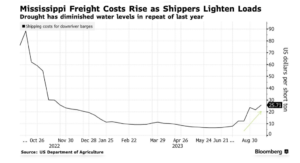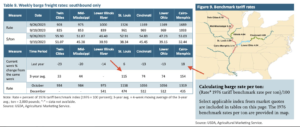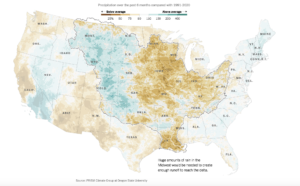As a result of the attack on Iran, nitrogen fertilizer at the port of New Orleans has seen an increase in price this week. Urea prices for barges in New…
Lower Water Levels on Mississippi Put “Crop Exports at Risk,” Impact New Orleans Drinking Water
Bloomberg writer Michael Hirtzer reported on Friday that, “America’s crop exports are once again at risk due to a diminished Mississippi River.
“Months of dry weather and the hottest summer ever shrunk the vital channel that funnels barges of grain and soybeans from the Midwestern crop belt to Gulf Coast ports.
UPDATE: For the second year in a row water levels in the Mississippi River are reaching record lows.
— Griffin S. DeMarrais (@GDeMarraisTV) September 28, 2023
The river is currently at -10.63 ft. according to @NWSMemphis and these photos show the issues it causes at the Osceola Ports. @Region8News pic.twitter.com/g13rLM8BRT
“Barge operators now are running lighter loads to compensate for the lack of water.
Barge movements on the #Mississippi River
— FarmPolicy (@FarmPolicy) September 29, 2023
For the week ending September 23:
17 percent lower than last year
and 79 percent lower than the 3-year average.https://t.co/qwZCgtcKDs pic.twitter.com/0GtJILPUKm
“Prices paid to farmers for their crops are easing as a result, with seasonal pressure from the autumn harvest further weighing on the market.

“Shipping costs for barges along the river surged in September, with spot rates rising as much as 64% in a week at Memphis, Tennessee, according to US Department of Agriculture data.

“Higher transport costs help make US crops more expensive than shipping out of countries such as Brazil — when bigger South American harvests were already taking market share from North America.”
Meanwhile, Jacey Fortin reported in Saturday’s New York Times that, “People in New Orleans are used to preparing for hurricanes and floods. So when they learned of a new threat — an infusion of salty water creeping slowly up the Mississippi River, threatening municipal drinking water supplies — they did what comes naturally: strip bottled water from grocery store shelves.

“But this is a crisis with even more lead time than a storm churning in the Gulf of Mexico: The worst of the saltwater intrusion isn’t expected to reach the city until late October. And the salty water could stick around for much longer, potentially corroding the city’s lead-lined pipes.”
#Drought Monitor -River Basins
— FarmPolicy (@FarmPolicy) September 30, 2023
* #MississippiRiver pic.twitter.com/aVuVMTWuZ1
The Times article explained that, “The crisis is a result of drought conditions in the Midwest, which have sapped water levels in the Mississippi, allowing salty water from the Gulf to creep upstream beneath a freshwater layer.”
Mississippi River at Memphis pic.twitter.com/4m67Ss9S1U
— FarmPolicy (@FarmPolicy) September 30, 2023
Fortin added that, “Officials with the U.S. Army Corps of Engineers say the ‘saltwater wedge,’ which has already affected communities downstream, could reach water treatment plants near New Orleans in about a month, pushing the salty water into household faucets.
Mississippi River at Vicksburg pic.twitter.com/pzk9w5Dk09
— FarmPolicy (@FarmPolicy) September 30, 2023
“About a million people across southeastern Louisiana could be affected.”





